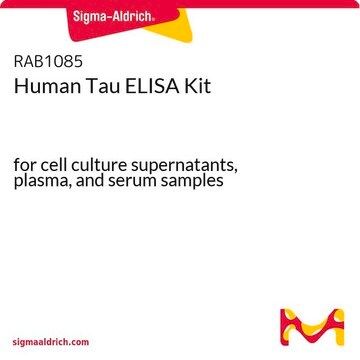推薦產品
生物源
human
品質等級
重組細胞
expressed in E. coli
化驗
>95% (SDS-PAGE)
形狀
frozen liquid
比活性
24.07
分子量
23 kDa
濃度
0.9 mg/mL
儲存溫度
−70°C
基因資訊
human ... HPGDS(27306)
一般說明
using spectrophotometric determination of 1-fluoro-2,4-dinitrobenzene (FDNB) conjugation with reduced glutathione (1 mM) in 100 mM NaPO4 (pH 6.5) at room temperature.
生化/生理作用
Glutathione S-transferase sigma 1, also know as hematopoietic prostaglandin D synthase (HPGDS) is an enzyme that in humans is encoded by the HPGDS gene. Glutathione S-transferases (GSTs) are a family of enzymes that play an important role in detoxification by catalyzing the conjugation of many hydrophobic and electrophilic compounds with reduced glutathione. Based on their biochemical, immunologic, and structural properties, cytosolic and membrane-bound forms of glutathione S-transferase are encoded by two distinct supergene families. At present, eight distinct classes of the soluble cytoplasmic mammalian glutathione S-transferases have been identified: alpha, kappa, mu, omega, pi, sigma, theta and zeta. The GSTs are thought to function in xenobiotic metabolism and play a role in susceptibility to cancer, and other diseases.
Prostaglandin-D synthase is a sigma class glutathione-S-transferase family member. The enzyme catalyzes the conversion of PGH2 to PGD2 and plays a role in the production of prostanoids in the immune system and mast cells. The presence of this enzyme can be used to identify the differentiation stage of human megakaryocytes.
儲存和穩定性
The enzyme should be used by the end-user customer within 1 year of receipt.
儲存類別代碼
10 - Combustible liquids
水污染物質分類(WGK)
WGK 1
閃點(°F)
Not applicable
閃點(°C)
Not applicable
分析證明 (COA)
輸入產品批次/批號來搜索 分析證明 (COA)。在產品’s標籤上找到批次和批號,寫有 ‘Lot’或‘Batch’.。
Morten Hohwy et al.
Journal of medicinal chemistry, 51(7), 2178-2186 (2008-03-18)
We describe the discovery of novel inhibitors of prostaglandin D2 synthase (PGDS) through fragment-based lead generation and structure-based drug design. A library of 2500 low-molecular-weight compounds was screened using 2D nuclear magnetic resonance (NMR), leading to the identification of 24
Marcus Kjellander et al.
Analytical biochemistry, 446, 59-63 (2013-10-26)
The previously uncharacterized Drosophila melanogaster Epsilon-class glutathione transferases E6 and E7 were immobilized on nanoporous alumina. The nanoporous anodized alumina membranes were derivatized with 3-aminopropyl-triethoxysilane, and the amino groups were activated with carbonyldiimidazole to allow coupling of the enzymes via
Brigette L Tippin et al.
Prostaglandins & other lipid mediators, 97(1-2), 22-28 (2011-08-09)
Intestinal tumors in Apc(Min/+) mice are suppressed by over-production of HPGDS, which is a glutathione transferase that forms prostaglandin D(2) (PGD(2)). We characterized naturally occurring HPGDS isoenzymes, to see if HPGDS variation is associated with human colorectal cancer risk. We
Tsuyoshi Inoue et al.
Journal of biochemistry, 135(3), 279-283 (2004-04-29)
Hematopoietic prostaglandin (PG) D synthase (H-PGDS) is responsible for the production of PGD(2) as an allergy or inflammation mediator in mast and Th2 cells. We determined the X-ray structure of human H-PGDS complexed with an inhibitor, 2-(2'-benzothiazolyl)-5-styryl-3-(4'-phthalhydrazidyl) tetrazolium chloride (BSPT)
我們的科學家團隊在所有研究領域都有豐富的經驗,包括生命科學、材料科學、化學合成、色譜、分析等.
聯絡技術服務








